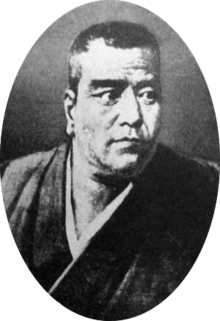Saigo Takamori
| Saigō Takamori | |
|---|---|

Saigō Takamori, by Edoardo Chiossone
|
|
| Native name | 西郷 隆盛 |
| Born | January 23, 1828 Kajiya-cho, Kagoshima-jōka, Satsuma Domain |
| Died | September 24, 1877 (aged 49) Yamashita-cho, Kagoshima-Fuka, Kagoshima Prefecture |
| Occupation | Samurai, politician |
| Parent(s) | Father: Saigo Kichibei Mother: Masa ? |
Saigō Takamori (Takanaga) (西郷 隆盛 (隆永)?, January 23, 1828 – September 24, 1877) was one of the most influential samurai in Japanese history, living during the late Edo and early Meiji periods. He has been dubbed the last true samurai. He was born Saigō Kokichi (西郷 小吉), and received the given name Takamori in adulthood. He wrote poetry under the name Saigō Nanshū (西郷 南洲). His younger brother was Gensui The Marquis Saigō Tsugumichi.
Saigō Takamori was born in the Satsuma Domain (modern Kagoshima Prefecture) on January 23, 1828, or December 7 in the lunar calendar in the tenth year of the Bunsei era.
Saigō served as a low-ranking samurai official in his early career. The Saigō family's official status was Jōkashi (full samurai) but lived as Gōshi (rural samurai), part-peasant and part-warrior. Though they should have been able to live on a stipend from the fief and the daimyō, in practice, the Saigōs lived more like Gōshi and were quite poor, and had debts Saigō Takamori needed 25 years to repay.
Saigō Takamori was recruited to travel to Edo (modern Tokyo) in 1854 to assist the daimyō of Satsuma, Shimazu Nariakira, in the Kōbu gattai movement (promoting reconciliation and closer ties between the Tokugawa shogunate and the Imperial court).
...
Wikipedia
